Contents
Guide
Pagebreaks of the print version
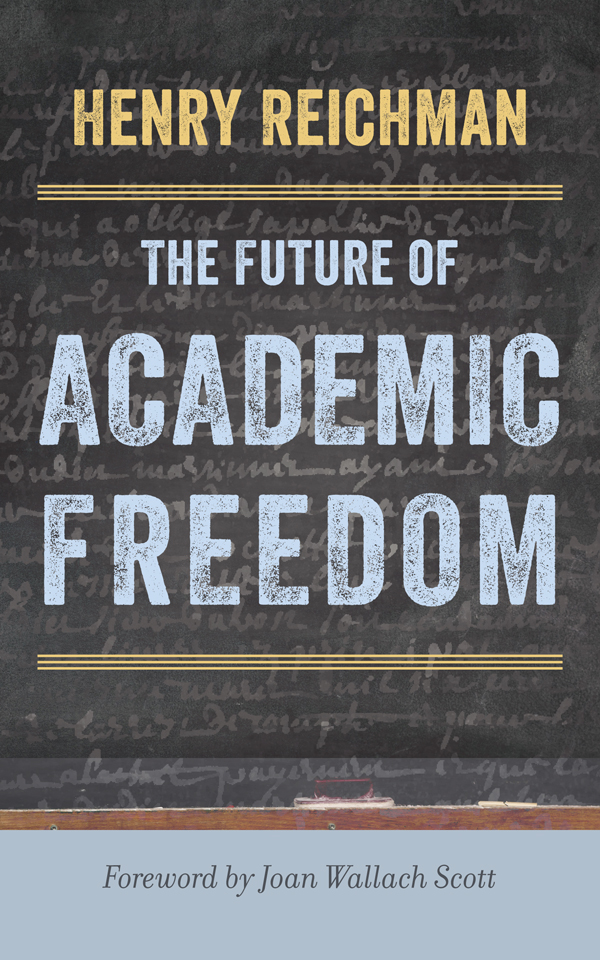
The Future of Academic Freedom
C RITICAL U NIVERSITY S TUDIES
Jeffrey J. Williams and Christopher Newfield, Series Editors

The Future of Academic Freedom
Henry Reichman
Foreword by Joan Wallach Scott
 JOHNS HOPKINS UNIVERSITY PRESS BALTIMORE
JOHNS HOPKINS UNIVERSITY PRESS BALTIMORE
2019 Johns Hopkins University Press
All rights reserved. Published 2019
Printed in the United States of America on acid-free paper
9 8 7 6 5 4 3 2 1
Johns Hopkins University Press
2715 North Charles Street
Baltimore, Maryland 21218-4363
www.press.jhu.edu
Library of Congress Cataloging-in-Publication Data
Names: Reichman, Henry, 1947 author. | Scott, Joan Wallach, author of foreword.
Title: The future of academic freedom / Henry Reichman ; foreword by Joan Wallach Scott.
Description: Baltimore : Johns Hopkins University Press, 2019. | Series: Critical university studies | Includes bibliographical references and index.
Identifiers: LCCN 2018032666 | ISBN 9781421428581 (hardcover : alk. paper) | ISBN 9781421428598 (electronic) | ISBN 142142858X (hardcover : alk. paper) | ISBN 1421428598 (electronic)
Subjects: LCSH: Academic freedomUnited States. | Education, HigherPolitical aspectsUnited States. | Higher education and stateUnited States.
Classification: LCC LC72.2 .R45 2019 | DDC 378.1/210973dc23
LC record available at https://lccn.loc.gov/2018032666
A catalog record for this book is available from the British Library.
Special discounts are available for bulk purchases of this book. For more information, please contact Special Sales at 410 -- 6936 or specialsales@press.jhu.edu.
Johns Hopkins University Press uses environmentally friendly book materials, including recycled text paper that is composed of at least 30 percent post-consumer waste, whenever possible.
In memory of
Reginald Zelnik
and
Judith Krug
mentors, friends, champions of free speech
Contents
Foreword
The past few years have seen increasing attention to questions of free speech and academic freedom amid a confusing outpouring of opinion about whether our campuses are hotbeds of leftist authoritarianism unfriendly to conservative thought. Much of this attention has been provoked by a concerted right-wing campaign to discredit higher education and the critical thinking it is meant to encourage. With the election of Donald J. Trump in 2016, the steady erosion of state and federal support for universities, underway for many years, has intensified. His outright disdain for so-called elites has encouraged unprecedented expressions of hatred for the work of college and university teachers; his secretary of education has defined our teaching as dangerous indoctrination; his judges are in the process of dismantling protections for unions, teachers unions among them. And the media frenzy his performances have created has only intensified the misinformation he and his minions seek to peddle.
In the face of all the fake news weve had about campus life in the twenty-first century, Henry Reichmans book comes as a welcome relief. It is an engaging, detailed, and thorough study of the meaning, history, uses, and abuses of academic freedom as it has been defined and defended by the American Association of University Professors (AAUP). Reichman has served as a vice president of the association and has led its Committee on Academic Freedom and Tenure (Committee A) for the past six yearsa tumultuous time in US history. As he points out, however, the sense of peril is not new: the founding of the AAUP and its articulation of the principles of academic freedom more than a century ago were responses by embattled professors to assaults on their profession.
In this book, Reichman engages a vast theoretical, practical, and political literature that covers terrain both historical and contemporary. His approach is critical: he rejects the notion that the university is a marketplace of ideas, insisting insteadas the AAUP founders didon the importance of professional expertise; he embraces the idea that education exists to advance the common good, measured not in economic terms but as an enhancement of the human spirit; and he is adamant about the importance of protecting the political rights of students and faculty alike to protest inequality and injustice on campus and in the larger society.
His arguments on these issues are nuanced, and they will be of enormous help to those who want to formulate positions on matters ranging from the free speech rights of controversial speakers to the value of collective bargaining for college and university teachers. He offers important statistics to illustrate his points, whether about the corporatization of the academy or the incidences of left-wing student protest. (One set of figures should put to rest the claim that the Right is always the victim of the Left in these protests. Attacks on faculty and students who deplore Israels treatment of Palestinians far outnumber protests against the likes of provocateurs Ann Coulter and Milo Yiannopoulos.) The wisdom in these pages is distilled from years of thinkingReichman embodies the careful and committed approach of AAUP leaders over the years, but he brings to it his own experience as a student protester at Columbia University in 1968, as a faculty leader at California State University, East Bay, and, most recently, as chair of AAUPs Committee A.
These references to his experiences, as well as the detailed discussion of a number of Committee A investigations, make the text a lively read. One gets to think with him about some tricky issues: What are the limits of the hecklers vetothe silencing of speech by protesters? What is the difference between free speech and academic freedom? Does the university have the right to prohibit certain forms of speech it deems contrary to its mission? What should the administrative response be to faculty targeted for online harassment? In the process, the reader becomes familiar with what might be called the logic of AAUP reasoninga complex process, based on careful examination of context, precedent, possible effects, and the consideration of what have come to be fundamental principles of due process and fair practice.
The title of the book implies a serious and disturbing question: Can the special freedom claimed for the academic mission survive the attacks upon it? What is the future of academic freedom? Reichmans answer is not reassuring. His chapters introduce us to the changes that have undermined the status and influence of higher education in the United States: dramatic cuts in funding at the state and federal levels; the substitution of contingent for tenured faculty; the denial of faculty participation in university decision-making; the administrative embrace of corporate thinking that attends to bottom lines, defines students as paying customers, and calculates its response to difficult issues (student protests, curriculum changes, donor mandates) in terms of risk and reputation (how will this affect the brand?); and the increasing interference by trustees and politicians in the operations of the academy. The current controversies are only the latest stage in a long, slow decline that has been marked by AAUP resistance all along the way. Reichman cites again and again the associations recommendations, critical reports, amicus curiae briefs, and lots more. These have not stopped what sometimes feels like a relentless bulldozer destroying everything in its wake, and yet they have provided the grounds for resistance, the tools for organizing.


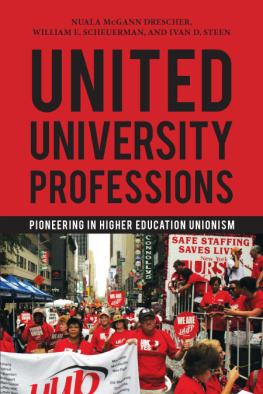
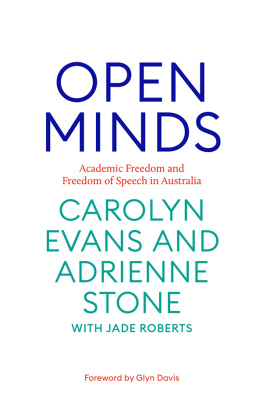
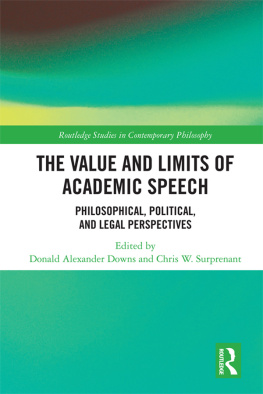
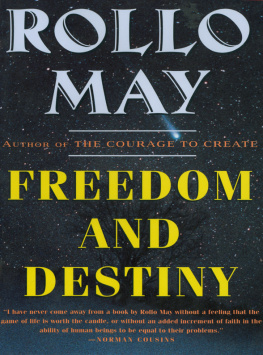
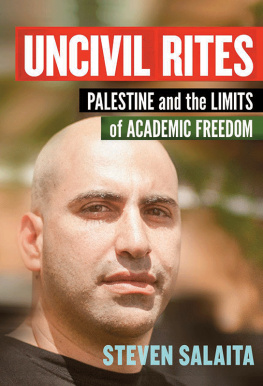
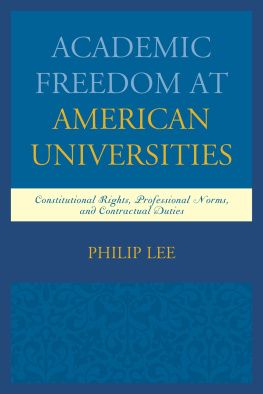
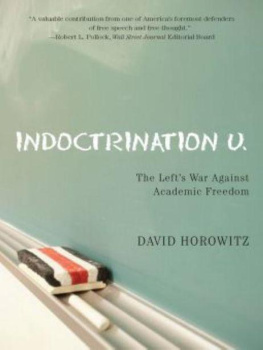


 JOHNS HOPKINS UNIVERSITY PRESS BALTIMORE
JOHNS HOPKINS UNIVERSITY PRESS BALTIMORE